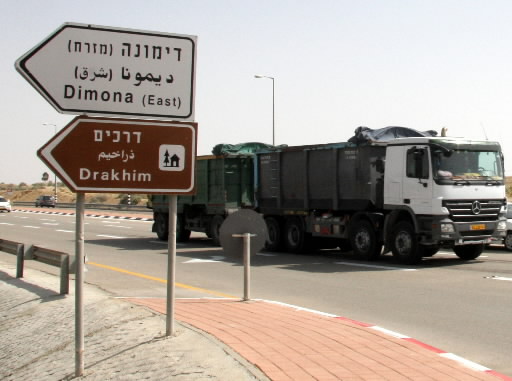Nuclear Weapons Can Be Eliminated: Chapter 10, Part 1
May 13, 2010
Chapter 10: The Middle East, Flash Point of the World
Part 1: Israel's nuclear weapons
by Keisuke Yoshihara, Staff Writer
Development and possession of nuclear weapons an open secret
I visited three countries in the Middle East: Israel, which is presumed to possess nuclear weapons; Iran, which has clung to its own uranium enrichment program despite condemnation from the international community; and Egypt, which insists on removing all weapons of mass destruction from the region. The future of the Middle East, where conflict continues uninterrupted, could determine the future of nuclear conditions in the world. In each nation, I explored the thinking behind its nuclear policies.
In Jerusalem, the capital of Israel, I posed a question to my taxi driver: "Do you think Israel has nuclear weapons?" The taxi driver responded in an animated way, the excitement even causing him to take his hands off the steering wheel. "Of course it does," he said. "It's no secret. They're in Dimona."
Dimona is a small town, located in a remote spot in the Negev Desert, about 80 kilometers south of Jerusalem. Driving several kilometers to the east from downtown Dimona, we arrive at a bleak area, bounded by mountains of rock, and ringed by a long, three-meter tall fence. Surveillance cameras eye us and we are greeted by a sign, indicated in symbols, with the message "NO ENTRY, NO PHOTOGRAPHY" as well as a sign stating "MILITARY AREA." Far beyond the fences stands a luminous, silver building.
In October 1986, Mordechai Vanunu, a former engineer who once worked here, provided covert photographs showing the inside of the facility to a British newspaper. He revealed it to be Israel's base for the development and possession of nuclear weapons.
Hans Kristensen of the Federation of American Scientists (FAS) estimates that Israel currently holds as many as 80 nuclear warheads. As the nation is not a signatory of the Nuclear Non-proliferation Treaty (NPT) and does not officially acknowledge possessing nuclear weapons, the international community refers to it with the indirect wording: "de facto nuclear weapon state."
The United States, which reacts sharply to the nuclear development activities of Iran, has long let pass the possession of nuclear arms by Israel.
Why does Israel possess nuclear weapons? To this question, Shlomo Aronson, a professor of political science at Hebrew University in Jerusalem, explained: "Due to the history of Holocaust involving the Jewish people and the conflicts with its neighbors over the founding of the state of Israel in 1948, even the first prime minister of the country was contemplating a nuclear arsenal. When the nation's finances and technology permitted such development, it launched the plan to possess nuclear arms."
Many Arab nations do not even recognize the existence of Israel as a nation. From the perspective of the Jewish nation, nuclear weapons are the answer to the question of security with regard to its Muslim neighbors. In fact, Israel reportedly considered using nuclear weapons when it was attacked by Egypt in the fourth regional war in 1973 and, at the time, stood in a weaker position.
The Israeli government has adhered to "a policy of ambiguity" in which the government neither admits nor denies its possession of nuclear weapons. I headed on to the Ministry of Foreign Affairs to hear its official view on the matter.
(Originally published on April 27, 2010)








